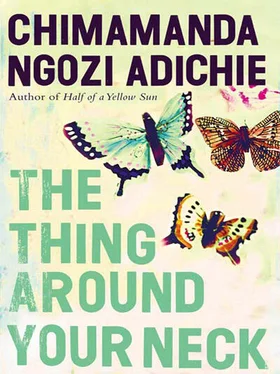He is naked now; he stretches and she watches the way his belly bobs up and down. In the early years, she would shower with him, sink down to her knees and take him in her mouth, excited by him and by the steam enclosing them. But now, things are different. She has softened like his belly, become pliable, accepting. She watches him walk into the bathroom.
“Can we cram a year’s worth of marriage into two months in the summer and three weeks in December?” she asks. “Can we compress marriage?”
Obiora flushes the toilet, door open. “What?”
“ Rapuba . Nothing.”
“Shower with me.”
She turns the TV on and pretends she has not heard him. She wonders about the girl with the short curly hair, if she showers with Obiora. She tries, but she cannot visualize the shower in the house in Lagos. A lot of gold trimmings — but she might be confusing it with a hotel bathroom.
“Darling? Shower with me,” Obiora says, peeking out of the bathroom. He has not asked in a couple of years. She starts to undress.
In the shower, as she soaps his back, she says, “We have to find a school for Adanna and Okey in Lagos.” She had not planned to say it, but it seems right, it is what she has always wanted to say.
Obiora turns to stare at her. “What?”
“We are moving back at the end of the school year. We are moving back to live in Lagos. We are moving back.” She speaks slowly, to convince him, to convince herself as well. Obiora continues to stare at her and she knows that he has never heard her speak up, never heard her take a stand. She wonders vaguely if that is what attracted him to her in the first place, that she deferred to him, that she let him speak for both of them.
“We can spend holidays here, together,” she says. She stresses the “we.”
“What …? Why?” Obiora asks.
“I want to know when a new houseboy is hired in my house,” Nkem says. “And the children need you.”
“If that is what you want,” Obiora says finally. “We’ll talk about it.”
She gently turns him around and continues to soap his back. There is nothing left to talk about, Nkem knows; it is done.
Chika climbs in through the store window first and then holds the shutter as the woman climbs in after her. The store looks as if it was deserted long before the riots started; the empty rows of wooden shelves are covered in yellow dust, as are the metal containers stacked in a corner. The store is small, smaller than Chika’s walk-in closet back home. The woman climbs in and the window shutters squeak as Chika lets go of them. Chika’s hands are trembling, her calves burning after the unsteady run from the market in her high-heeled sandals. She wants to thank the woman, for stopping her as she dashed past, for saying “No run that way!” and for leading her, instead, to this empty store where they could hide. But before she can say thank you, the woman says, reaching out to touch her bare neck, “My necklace lost when I’m running.”
“I dropped everything,” Chika says. “I was buying oranges and I dropped the oranges and my handbag.” She does not add that the handbag was a Burberry, an original one that her mother had bought on a recent trip to London.
The woman sighs and Chika imagines that she is thinking of her necklace, probably plastic beads threaded on a piece of string. Even without the woman’s strong Hausa accent, Chika can tell she is a Northerner, from the narrowness of her face, the unfamiliar rise of her cheekbones; and that she is Muslim, because of the scarf. It hangs around the woman’s neck now, but it was probably wound loosely round her face before, covering her ears. A long, flimsy pink and black scarf, with the garish prettiness of cheap things. Chika wonders if the woman is looking at her as well, if the woman can tell, from her light complexion and the silver finger rosary her mother insists she wear, that she is Igbo and Christian. Later, Chika will learn that, as she and the woman are speaking, Hausa Muslims are hacking down Igbo Christians with machetes, clubbing them with stones. But now she says, “Thank you for calling me. Everything happened so fast and everybody ran and I was suddenly alone and I didn’t know what I was doing. Thank you.”
“This place safe,” the woman says, in a voice that is so soft it sounds like a whisper. “Them not going to small-small shop, only big-big shop and market.”
“Yes,” Chika says. But she has no reason to agree or disagree, she knows nothing about riots: the closest she has come is the pro-democracy rally at the university a few weeks ago, where she had held a bright green branch and joined in chanting “The military must go! Abacha must go! Democracy now!” Besides, she would not even have participated in that rally if her sister Nnedi had not been one of the organizers who had gone from hostel to hostel to hand out fliers and talk to students about the importance of “having our voices heard.”
Chika’s hands are still trembling. Just half an hour ago, she was in the market with Nnedi. She was buying oranges and Nnedi had walked farther down to buy groundnuts and then there was shouting in English, in pidgin, in Hausa, in Igbo. “Riot! Trouble is coming, oh! They have killed a man!” Then people around her were running, pushing against one another, overturning wheelbarrows full of yams, leaving behind bruised vegetables they had just bargained hard for. Chika smelled the sweat and fear and she ran, too, across wide streets, into this narrow one, which she feared — felt — was dangerous, until she saw the woman.
She and the woman stand silently in the store for a while, looking out of the window they have just climbed through, its squeaky wooden shutters swinging in the air. The street is quiet at first, and then they hear the sound of running feet. They both move away from the window, instinctively, although Chika can still see a man and a woman walking past, the woman holding her wrapper up above her knees, a baby tied to her back. The man is speaking swiftly in Igbo and all Chika hears is “She may have run to Uncle’s house.”
“Close window,” the woman says.
Chika shuts the windows and without the air from the street flowing in, the dust in the room is suddenly so thick she can see it, billowing above her. The room is stuffy and smells nothing like the streets outside, which smell like the kind of sky-colored smoke that wafts around during Christmas when people throw goat carcasses into fires to burn the hair off the skin. The streets where she ran blindly, not sure in which direction Nnedi had run, not sure if the man running beside her was a friend or an enemy, not sure if she should stop and pick up one of the bewildered-looking children separated from their mothers in the rush, not even sure who was who or who was killing whom.
Later she will see the hulks of burned cars, jagged holes in place of their windows and windshields, and she will imagine the burning cars dotting the city like picnic bonfires, silent witnesses to so much. She will find out it had all started at the motor park, when a man drove over a copy of the Holy Koran that lay on the roadside, a man who happened to be Igbo and Christian. The men nearby, men who sat around all day playing draughts, men who happened to be Muslim, pulled him out of his pickup truck, cut his head off with one flash of a machete, and carried it to the market, asking others to join in; the infidel had desecrated the Holy Book. Chika will imagine the man’s head, his skin ashen in death, and she will throw up and retch until her stomach is sore. But now, she asks the woman, “Can you still smell the smoke?”
“Yes,” the woman says. She unties her green wrapper and spreads it on the dusty floor. She has on only a blouse and a shimmery black slip torn at the seams. “Come and sit.”
Читать дальше











